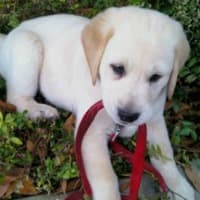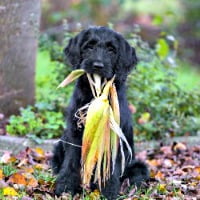Puppy Training Tips
Practical puppy training tips can be a lifesaver when you're faced with a new puppy who has no idea what you want from him, or how to behave in the world of humans.
As soon as you bring little Rascal home his puppy training begins.
First steps include name recognition, basic manners and potty training.
Add to that the need to learn obedience commands and social skills as he grows and you can see why any tips or tricks to lighten the load are in demand!
There are several different things to think about when training your puppy and these include:
- Managing your expectations
- Approaching the learning process in the right way
- How you want to potty train your puppy
- Behavior problem-solving
- Rewards and corrections
- Obedience commands
The help you need in all of these areas is on this page.
Click on the links listed above to jump straight to a specific section, or simply keep reading to get the big picture.
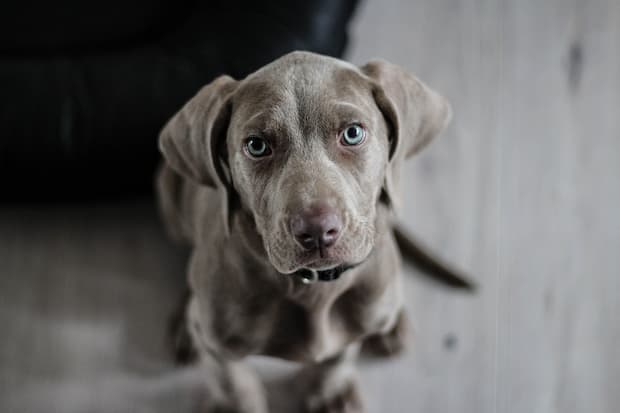
Unrealistic Expectations = Frustration
Thisis a subject that isn't often talked about in articles discussing puppy training tips. But it should be.
So, why are your expectations so important? That's easy!
If you have an unrealistic expectation of what your little Rascal is capable of, he will never meet your goals for him, no matter how hard he tries.
This inevitably leads to frustration and disappointment on your part, to anxiety and stress on his.
Your puppy wants to please you. He thrives on being a 'good boy'. However, his abilities are limited by his age, attention span and stage of puppy development.
For example, no matter what you may read online, an 8 week old puppy will NOT be reliably housebroken inside a week.
He simply doesn't have the physical bladder/bowel control to 'hold it' or the slightest notion of where you find acceptable for his elimination.
The physical ability will improve as he grows (crate training will help him to learn how to control his bladder/bowels too), the understanding of where his potty spot is will come with practice which creates a habit.
Tailor your expectations and demands of your puppy to his physical, emotional and social development and create a win-win situation!
The Right Approach to Puppy Training
All puppies have the innate desire to please their people, and are capable of learning almost anything you want to teach them (within reason!).
By approaching little Rascal's training with a happy, upbeat and positive attitude you'll maximize his enjoyment... and what he can achieve.
One of the very important potty training tips is to never use negative or punitive tactics when training your puppy (or your dog for that matter).
Punishing Rascal for misbehaving or getting something wrong, is never acceptable and will only make him anxious or scared and afraid of you.
It will not help him to learn what you want from him, or help you build a loving relationship with him.
Only positive, rewards based dog training methods are effective in the long-term and increase the bond and relationship between puppy and owner.
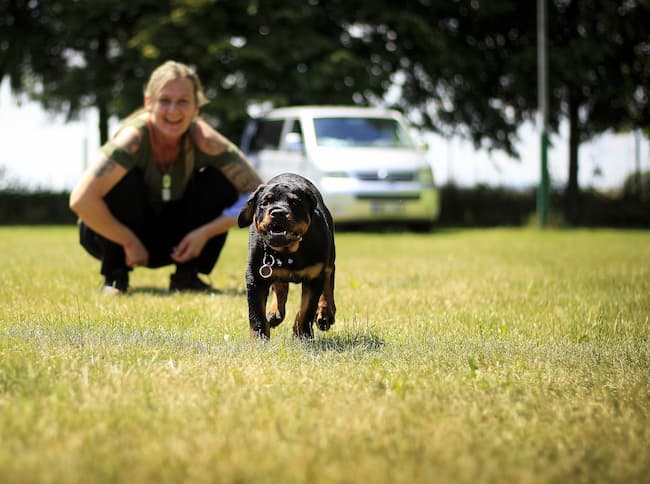
The reward part of the equation is often a (very small) tasty treat, but praise, a favorite toy or game or just a cuddle can be given too.
Puppies, especially young ones, have a very short attention span so it's vital to keep training sessions short to begin with.
A couple of minutes is more than enough for an 8 - 10 week old puppy.
Half a dozen two-minute training sessions per day will be far more effective, than one ten minute one because Rascal will lose interest and focus after two or three minutes (tops) and then training will become a struggle rather than fun.
Puppy Training Tips - Housetraining
Potty training your puppy is one of the first, and biggest, training tasks you have as a new owner.
Luckily with the right equipment, approach and guidelines, puppy house-training can be straightforward and relatively stress free (for both of you).
Crate training is the simplest and most effective method and using a crate as containment, combined with close supervision at all other times makes potty training SO much easier.
More puppy training tips to help with housebreaking:
- Follow a regular daily routine of meals and potty breaks
- Teach Rascal a potty phrase (eg. "go potty" or "hurry up")
- Praise your pup lavishly every time he pees/poops in the right place
- Take Rascal out during the night if needed during the early weeks
- Use a enzymatic cleaner to remove the odor of potty mistakes
It's impossible to avoid ALL potty accidents in the early days, possible even weeks, so be realistic in your expectations.
However, if you approach puppy potty training in the right way you can minimize the mistakes and speed up the learning curve dramatically.
Click on this link to find out how to housebreak your puppy without losing your sanity!
No Fenced Yard for Housetraining?
If you don't have access to a safe, fenced area for your puppy to eliminate in or for any reason you aren't able to take your puppy outdoors to pee/poop, there are options.
These include puppy pee pads, doggie litter boxes and portable dog potties.
They are going to be less suitable, especially in the long-term, than an outdoor area but if there's absolutely no other choice give them a try.
Of the three options, a portable dog potty that has grass (preferably real grass) is by far the best one to choose.
This much more likely to be used for the purpose for which it's intended, rather than as a toy or sandbox for digging!
Even more importantly, letting little Rascal used to the feel of grass underfoot while he eliminates will make transitioning to outdoor potty-ing at some future point in time much easier.
A couple of examples of the best portable dog potties include the Fresh Patch Disposable Dog Potty (real grass) and the Petsafe Piddle Place Dog Potty (artificial grass).
You can use these potties indoors, outdoors on a balcony, or even outdoors on a patio/concrete area if you have no grass in your yard.
Puppy Training & Behavior Problems
Puppies are baby dogs, and when they're young they act exclusively on their hard-wired canine impulses and instinctive behaviors.
These include:
- Nipping and biting
- Jumping
- Licking
- Chewing
- Barking or growling
- Chasing small fast moving objects/creatures
Pretty much all of those often sound like MISbehavior to us humans, but to little Rascal they're simply what he's familiar with and is genetically designed to do.
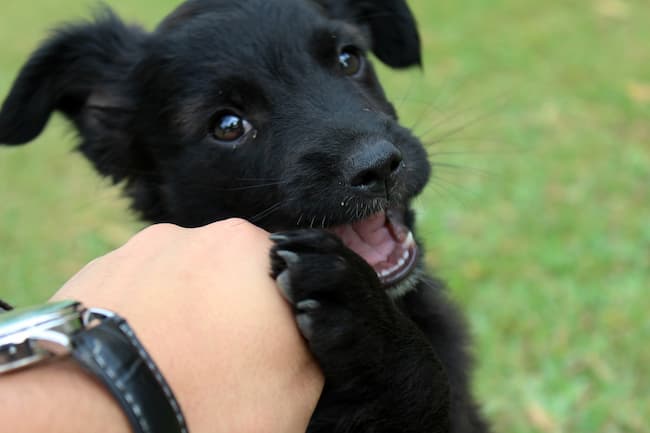
Once you realize that your puppy isn't being 'bad' or 'disobedient', it's easier to deal with and you're able to correct and reshape the behavior issues that are causing problems.
When you bring your puppy home he has no idea what you expect from him, how to live with humans instead of dogs, what your words or actions mean, and so on.
It's up to you to teach him everything he needs to know, and to teach him with love, patience, understanding and commitment.
To learn what to expect behavior-wise and how to handle the issues listed above, check out my Puppy Behavior page.
It's also important to understand why puppies behave the way they do and what to expect from Rascal (and what he needs from you) at each stage of puppy development.
Your goal is to help your puppy understand how to fit into the human world without losing the uniqueness of being a dog, and to give him a safe and loving place to learn these lessons.
Puppy Training Tips - Reward & Correction
I talked briefly about the most common rewards used in puppy training a little earlier on this page.
Any list of puppy training tips worth reading should include a reference to using only positive training methods, and rewards-based training works beautifully.
Tiny tasty treats are what most trainers and owners use to train young puppies because they are generally very food oriented.
Occasionally a puppy isn't especially interested in treats but LOVES his ball, or his squeaky toy, enough for it to be a reward in itself.
This is trickier to work with than a treat because it takes longer to throw the ball or squeak the toy with him each time he gets something right.
A heartfelt 'good boy' or a pat on the head or scratch of the muzzle works well too and can be combined with the toy (switching between the two) to make lessons flow more smoothly.
Also remember that your puppy loves to please you and knowing that you're happy with him makes his day!
As your puppy gets older and more familiar with behavior expectations and obedience you can faze out the treats as a reward.
Start by giving him a treat every second or third time he gets something right, and then slowly work towards giving a treat randomly and you'll avoid having a dog who won't do a thing you tell him unless you're holding his favorite treat!
A verbal reward such as 'good boy' or 'well done' or a hug, pat or scratch should never be fazed out.
Rascal will always need to know you're happy with him and that you love him.
Puppy Training Tips for Obedience
Puppy obedience training starts off with simple things like name recognition and learning a basic command such as 'Sit'.
It can extend pretty much as far as you want it to and dogs are capable of learning very complex and challenging commands and concepts.
It's perfectly possible to teach your puppy obedience commands at home as long as you follow some simple puppy training tips and guidelines, but having him join in a formal Puppy Obedience class has a lot of benefits, for you both.
Formal puppy classes give you access to a professional trainer who will help you teach your puppy how to respond to your commands in the right way, as well as helping with any issues or problems that come up.
This type of class also gives little Rascal essential socialization experience in a controlled setting and gives you other like-minded puppy parents to share stories or challenges with.
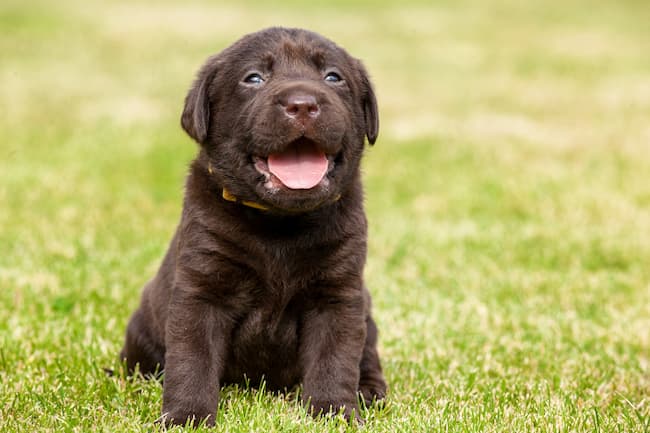
At a minimum you want your puppy to learn the dog training commands Sit, Down, Stay, Leave It and Come. You also need to practice puppy leash training.
Puppy training tips that will help with obedience training include:
- Make sessions short (2 - 5 minutes), especially at first
- Have multiple training sessions each day
- Always use positive, rewards-based training methods
- Never get mad at your puppy, or punish him for not getting it right
- Reality-check your expectations
- Practice every day if possible, or at least five times per week
- Make learning fun and love-filled so that Rascal enjoys it
- End each session on a positive with something your pup does well
One of your puppy's first lessons is to learn his name.
Use little Rascal's name every time you talk to him right from day one.
To speed up his name recognition do this:
When your pup is close to you and isn't busy with an engrossing task, say his name in a happy upbeat voice and when he turns to look at you (or comes over to you) say "Good Rascal" and give him a treat.
Making eye contact with him is important so if he's not looking at your face, hold the treat at eye level to draw his eyes to yours and once eye-contact is made then give him the treat.
Once your pup responds to his name when he's close to you and not busy, start repeating the process when he is a little further away, or chewing on a toy etc.
Eventually your aim is for him to look directly at you, making eye contact, whenever you say his name.
You Might Also Like:
- Home
- Puppy Training Tips
